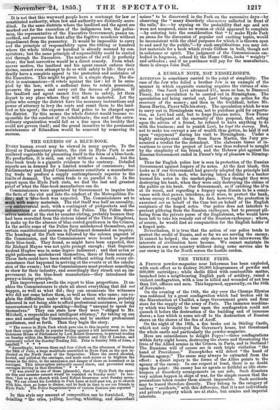THE GENESIS OF A BL U}-BOOK.
EVERT human event may be viewed in many aspects. To the Royal or Parliamentary printer, the riot in Hyde Park is now rendered cognizable by presenting itself in the form of a blue-book. No production, it is said, can exist without a demand; but the blue-book trade is a gigantic evidence to the contrary. Detailed reports are in demand for a limited number of consumers ; but Parliamentary and Royal Commissioners constitute a manufactur- ing trade to produce a supply contemptuously superior to the limits of demand. The cotton trade is no parallel to it. In the report upon the Hyde Park riots, we find the last and greatest proof of what the blue-book manufacture can do.
Commissioners were appointed by Government to inquire into the facts of the riot and into the conduct of the Metropolitan Po-
; and a blue-book was expected. The . Commissioners set to wow-soanty materials. The riot itself was half an unreality, eantroversial mob, with a contingent of pickpockets and the indiseretions or shortcomings of the Police. The Police them- seltes-assisted at the riot by counter-rioting, probably because they had been recruited from the riotous island of the Three Kingdoms, to make up for the absence of blue-coated gentlemen in the Crimea. In the melee some of the Police force misbehaved themselves, and certain constitutional persons in Parliament demanded an inquiry. The humbug of the Park was followed by the solemn pageant of the Commission, and the Commissioners were bound to produce their blue-book. They found, as might have been expected, that Sir Richard Mayne was not quite prompt enough; that Superin- tecdent Hughes was in some degree indiscreet; and that seven or eight policemen misbehaved themselves, three of them seriously. These facts could have been stated without setting forth every cir- cumstance that happened in arriving at the events or at the conclu- sion of the events ; but the Commissioners must produce something to show for their industry, and accordingly they struck out an im- provement in the blue-book manufacture—they introduced the penny-a-lining principle. This improvement swells the report to blue proportions. It en- ables the Commissioners to state all about everything that did not happen, as well as what did; they can enumerate the witnesses who did not come before them, as well as those who came; can ex- plain the difficulties under which the absent witnesbes probably laboured in not being able to afford professional assistance, or being unaccustomed to public speaking—feeling "unequal to speak for themselves." They can state how they were "obliged to Mr. Mitchell, a respectable and intelligent attorney," for taking up one case and assisting the Commissioners, and to another professional gentleman, and so forth. Then they begin the story.
"The scenes in Hyde Park which gave rise to this inquiry seem to have had their origin chiefly in popular feeling against a bill introduced into the Commons House of Parliament by Lord Robert Grosvenor, to prevent trading on Sunday within the Metropolitan Police district and City of London, and commonly called the Sunday-Trading Bill. Prior to Sunday 24th of June, a handbill ' • • • "Accordingly, between three and four o'clock on the afternoon of Sunday the 24th of June a large multitude assembled in Hyde Park on the spot in- dicated on the North bank of the Serpentine. There the crowd shouted, hooted, and yelled at the carriages, and made such noises as to frighten the
i
horses n the drive, to the annoyance and danger of those on horseback or in carriages. This interruption naturally caused alarm, and prevented many carriages driving in that direction" • • * "It was dated in one of these (placards], that at 'Hyde Park the open- air fete and monster concert would be repeated on Sunday next.' In ano- ther, 'Let us go to church with Lord Robert Grosvenor next Sunday morn- ing. We can attend his Lordship in Park Lane at half-past ten, go to church With him, then go home to dinner, and be back in time to see our friends in Hyde Park.' The Police Superintendents of various districts also reported"
•
In this style any amount of composition can be furnished. By detailing "the cries, yelling, hooting, whistling, and discordant
noises" to be discovered in the Park on the successive days—by observing the "many disorderly characters collected in front of the rails," &c.—by arguing on the probability that age and sex were not unspared, since no woman or child appeared to complain —by entering into the consideration that "to make Hyde Park an arena for the discussion of popular and exciting topics, would be inconsistent with the chief purposes for which it is thrown open to and used by the public,"—by such amplifications you may col- lect materials for a book which rivals Gibbon in bulk, though not in substance or spirit. The judgment of the Commissioners em- bodied in hugeness, echoed by the Home Office, looks " weighty " and orthodox ; and if no purchaser will pay for the manufacture, there is always John Bull.
























 Previous page
Previous page